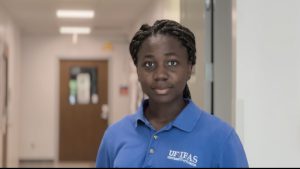FORT PIERCE, Fla.—Born in Nigeria, a lifelong citizen of Ghana, a graduate of Costa Rica’s EARTH University, and now a graduate student in the United States, every pace Grace Amponsah takes will help to advance women’s economic status in Ghana, West Africa.

Internship at UF/IFAS IRREC
Last month, Amponsah completed an internship at the University of Florida/IFAS Indian River Research and Education Center (IRREC) in Fort Pierce, Florida. There, Amponsah learned how to use biopesticides—biological material or organisms–that manage agricultural pests. Amponsah’s studies were supervised by Dr. Pasco Avery, whose work with invertebrate pathology is recognized by global leaders.
“Grace Amponsah understands that food production is vital to sustain and improve the economy for an entire nation,” said Avery, a biological scientist IV at IRREC. “An astute scholar and burgeoning scientist, Grace will use her increasing agricultural production skills to empower women in Ghana.”
Insect Pathology
Insect pathology is the study of naturally occurring microbial organisms that can cause disease in insects. Avery said entomopathogenic fungi are one of the organisms scientists use to protect valuable crops.
“When I found the UF/IFAS IRREC, I expressed my interest to the Director, Dr. Cave, about wanting to explore natural ways to manage pests in food production, and in his response, he informed me of the Entomopathogenic Fungi Research Laboratory (EFR Research Lab),” said Amponsah.
Amponsah emphasizes that crop pests are increasing worldwide, and natural pest control is part of a comprehensive, integrated pest management program that strives to protect the environment and produce food with minimal use of synthetic agrochemicals. She aims to train women who grow subsistence crops to increase production, market their crops and commercial operations, and manage their finances with best practices to improve their quality of life.
Training with Beneficial Fungi: Entomopathogenic Fungi
Avery and laboratory associates taught Amponsah how to use beneficial fungi on nursery citrus trees to manage the Asian citrus psyllid, an invasive insect associated with citrus greening, the world’s most serious citrus disease. In a large-scale field study, Avery and his laboratory associates proved that the fungi would attach to the psyllid and overcome the pest. But a second finding was that Florida’s many rain events wash away the sprayed-on fungi.
Avery’s current work is with an adjuvant to help the fungi adhere to citrus leaves during rainstorms.

A rainfast adjuvant
As a research intern in the EFR lab, Amponsah tested a ‘rainfast’ adjuvant product that helps the fungi persist on the tree leaves during simulated rain events. After the fungi mixed with the rainfast product, Amponsah and laboratory assistant, Lizbeth Ayayla placed the trees under a ‘rain simulator’ machine to shower the experimental trees.
The IRREC Rain Simulator

Constructed by Eduart Murcia, an IRREC graduate research assistant in Dr. Sandra Guzman’s Smart Irrigation and Hydrology Laboratory, the rain simulator is an 8-foot-tall structure able to simulate normal and high intensity rain events occurring in Fort Pierce, Florida.
“The simulator allows a better understanding of weather patterns and the development of water management plans in the region,” said Guzman.
Amponsah’s work was to determine if the rainfast product helped the fungi stick to the trees’ leaves during the simulated rain events. The work took place in an IRREC research greenhouse.

“From the preliminary results, we found that the fungi remain on the citrus tree leaves,” said Amponsah. “But more laboratory and then field experiments will determine the rainfast’s ability to keep the fungi in place through repeated rain events in a citrus grove.”
Economics of fungi and rainfast products
Another step the researchers must consider is whether the fungal and rainfast products are affordable for growers to use regularly. The cost of the products and growers’ yield is an important factor, said Amponsah.
Amponsah said women provide 60% to 80% of the agricultural labor force. Most of the women operate small-scale farmlands to produce food for their families.
A pivotal moment for Amponsah came when she realized a family member’s seeds produced more crops and were more resistant to crop pests. After a harvest and sale to a market, the family member could purchase books for their children.
Agriculture is an essential business in Africa
“That’s when I realized agriculture could be a business and that growers can use profits to send their children to school or improve their home life,” Amponsah said. “Farmers can move beyond subsistence farming.”
Ghanaian women growers face many challenges, and pest insects are one of the most serious issues. Amponsah believes higher education will lead her to mentor African women to manage pest insects, protect their crops, and increase yield and profits.
Pest control movement as a part of pest control
“I wanted to pursue pest control and study pest movement in Africa, and when I shared my interests with my friend Duplicate Sambani, a graduate student at UF/IFAS Citrus Research and Education Center in Lake Alfred, Florida, she told me about Dr. Ronald Cave at IRREC,” Amponsah said. “Dr. Cave told me about Dr. Avery’s work and arranged an interview.”
Now that her internship is complete, Amponsah has moved on to the next step. This month, Amponsah commenced a master’s degree program in entomology at Ohio State University, where she will advance her studies in pest behavior predictions to optimize pest management.
But women farmers in Ghana remain at the forefront of her aims.
Work with non-profit organizations to empower African women in Agriculture
Amponsah returns to Ghana during holiday breaks to volunteer with non-governmental organizations and visit women and their food production operations. She has worked with CAMFED Ghana, United Youth Initiative for Africa, and Lakesyde Farms. A resourceful, focused student and change agent, Amponsah collaborates with these organizations for grants and assistance to support the women growers in improving their agricultural enterprises.
“There are 16 regions in Ghana—all are agricultural. I have been to 14,” said Amponsah. “Soon, I will visit the last two—my commitment drives everything to uplift the woman of Ghana.”
 19
19
